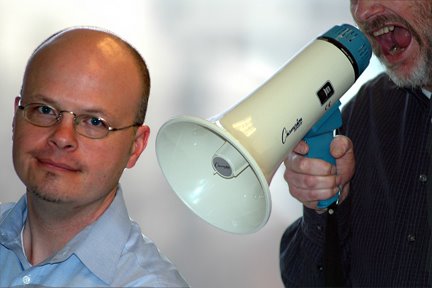Amplified Sound Truck in Downtown D.C.
The hot chicken noodle soup tasted good against today’s windy chill, as I spent my lunch hour catching up on the latest world news via the web. My office is on the sixth floor of a building in downtown Washington, D.C. We hear the daily city sounds of traffic, sirens, random shouts, and construction noise. But a different sound this afternoon sound caused me to put down my soup and look out the window.
It was a voice. It was a loud, amplified voice. It echoed off the sides of buildings and down the street. I peered down from my perch and could see a mini-van inching its way through traffic. A large, gray loudspeaker was mounted on its roof. A sign, which I could not read from my vantage point, hung on the door. I could hear the voice clearly up six stories and through sealed windows. The booming voice touted the virtues of Lyndon LaRouche.
Politics aside, this noise pollution, parading as “amplified free speech,” apparently is legal in Washington, D.C. How would our world be if everyone placed a loudspeaker on their car or on their corner? And what about the free speech rights of those who cannot afford an amplified loudspeaker?
The 1949 U.S. Supreme Court ruling in KOVACS v. COOPER directly addressed amplified speech on the street--including sound trucks. The court found that a municipal ban on the use of any sound system emitting "loud and raucous" noises on public streets did NOT violate the First and Fourteenth Amendments.
Why does the D.C. city council continue to reject the findings of a long-standing U.S. Supreme Court case? It’s time for the lawmakers to listen to citizen’s claims for “comfort and convenience.”
It was a voice. It was a loud, amplified voice. It echoed off the sides of buildings and down the street. I peered down from my perch and could see a mini-van inching its way through traffic. A large, gray loudspeaker was mounted on its roof. A sign, which I could not read from my vantage point, hung on the door. I could hear the voice clearly up six stories and through sealed windows. The booming voice touted the virtues of Lyndon LaRouche.
Politics aside, this noise pollution, parading as “amplified free speech,” apparently is legal in Washington, D.C. How would our world be if everyone placed a loudspeaker on their car or on their corner? And what about the free speech rights of those who cannot afford an amplified loudspeaker?
The 1949 U.S. Supreme Court ruling in KOVACS v. COOPER directly addressed amplified speech on the street--including sound trucks. The court found that a municipal ban on the use of any sound system emitting "loud and raucous" noises on public streets did NOT violate the First and Fourteenth Amendments.
Why does the D.C. city council continue to reject the findings of a long-standing U.S. Supreme Court case? It’s time for the lawmakers to listen to citizen’s claims for “comfort and convenience.”


4 Comments:
http://www.washingtonpost.com/wp-dyn/content/article/2006/01/25/AR2006012502261.html
Post article on protestors being denied a permit to protest the State of the Union. No great insight except for the fact that, in the article, the permit was a necessary step in order to demonstrate.
The D.C. government has jurisdiction over the corner at H and 8th Streets NE. According to the D.C. Emergency Management Agency website, First Amendment activities do not require a permit from Emergency Management, but from MPD:
"Activities protected by the First Amendment to the United States Constitution, including assemblages organized to consult for the common good, petition the government, exercise worship or religion, or demonstrate as a public display of sentiment for or against a person or cause for the purposes of speech making or address do not require the approval of the MSETG. Organizers of First Amendment activities should contact the Special Operations Division of the Metropolitan Police Department on 202-671-6522."
I feel for you, Klav. I live a few blocks away, where it is quiet, but I have lived above an evil, evil noisemaker in Dupont. Have you shown the 1949 decision to the noisemakers, to get their opinion?
I also sympathize--these noise nuisances should not be happening--not downtown, and not in residential areas. I'm going to send a copy of the decision to every councilmember.
Post a Comment
<< Home